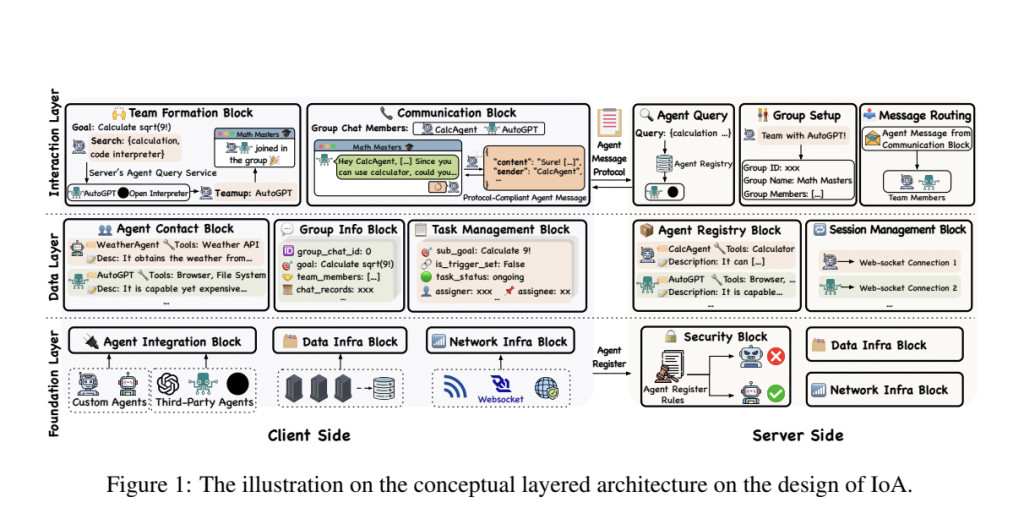The rapid advancement of LLMs has enabled the creation of highly capable autonomous agents. However, multi-agent frameworks need help integrating diverse third-party agents due to ecosystem constraints and limited by single-device setups and rigid communication pipelines. Inspired by the Internet’s success in fostering human collaboration through projects like Wikipedia and Linux, a key question arises: can we create a similar platform for autonomous agents? With LLM-based agents achieving near-human performance and continually improving, exploring the efficient orchestration of diverse third-party agents to enhance their collaborative potential is crucial.
Researchers from Tsinghua University, Peking University, Beijing University of Posts and Telecommunications, and Tencent propose the Internet of Agents (IoA) framework to enhance LLM-based multi-agent collaboration. IoA overcomes existing limitations by integrating diverse third-party agents across multiple devices, using an instant messaging-like architecture for dynamic teaming and flexible communication. Inspired by Speech Act Theory, IoA employs a finite-state machine for conversation flow control. Experiments show IoA outperforms state-of-the-art baselines in general tasks, embodied AI, and retrieval-augmented generation benchmarks, achieving superior performance and highlighting its potential for sophisticated, distributed multi-agent systems.
Recent advancements in LLMs, including GPT, Claude, and Gemini, have led to AI agents capable of natural language interactions and diverse task performance. Researchers have enhanced these agents by integrating external tools and knowledge sources, enabling them to access information beyond their pre-trained data. Examples include OS-Copilot for web and code terminal interactions, OpenDevin for software development, XAgent and Voyager for complex tasks, and Minecraft gameplay, respectively. Building on these successes, multi-agent systems like AgentVerse and AutoGen enable collaboration among LLM-based agents. Despite progress, challenges remain, such as integrating third-party agents and supporting distributed systems. IoA aims to overcome these challenges, offering a flexible, scalable platform for advanced multi-agent collaboration.
The IoA is a platform resembling an instant messaging app, enabling communication and collaboration among autonomous agents. It tackles distributed collaboration, dynamic communication, and heterogeneous agent integration. IoA’s server manages registration, discovery, and message routing, while the client provides agent communication interfaces. Key mechanisms include agent registration and discovery, autonomous team formation, structured conversation flow, and task assignment and execution. The system uses a comprehensive message protocol for efficient interaction. For instance, agents collaborate to write research papers, form teams, assign tasks, and integrate contributions to achieve the final goal.
The researchers conducted experiments to showcase IoA’s effectiveness in integrating heterogeneous agents across diverse tasks: tool variability, architectural diversity, observation/action spaces, and varied knowledge bases. IoA excelled in the GAIA benchmark, outperforming SoTA systems. It demonstrated superior collaboration in open-ended instruction tasks and embodied AI challenges, even when agents had different observation/action spaces. In retrieval-augmented generation tasks, IoA matched or exceeded GPT-4 performance. Analysis revealed precise team formation and cost-effective task execution despite suboptimal communication patterns. Overall, IoA is a robust platform for orchestrating diverse, multi-agent systems.
The study introduced IoA as an innovative framework for enhancing LLM-based multi-agent collaboration, drawing inspiration from Internet concepts. IoA overcomes the limitations of current frameworks by offering scalability, flexibility in integrating diverse third-party agents, and dynamic mechanisms for teaming and conversation control. Through rigorous benchmarking experiments, IoA demonstrated superior efficiency in fostering collaboration among heterogeneous agents, consistently surpassing existing benchmarks. As the field of LLM-based agents evolves, IoA is poised to become a cornerstone for future research and development in multi-agent collaboration. By enabling seamless integration of independently developed agents with specialized skills, IoA paves the way for advanced and impactful multi-agent systems.
Check out the Paper and GitHub. All credit for this research goes to the researchers of this project. Also, don’t forget to follow us on Twitter.Â
Join our Telegram Channel and LinkedIn Group.
If you like our work, you will love our newsletter..
Don’t Forget to join our 46k+ ML SubReddit
The post Internet of Agents (IoA): A Novel Artificial Intelligence AI Framework for Agent Communication and Collaboration Inspired by the Internet appeared first on MarkTechPost.
Source: Read MoreÂ
